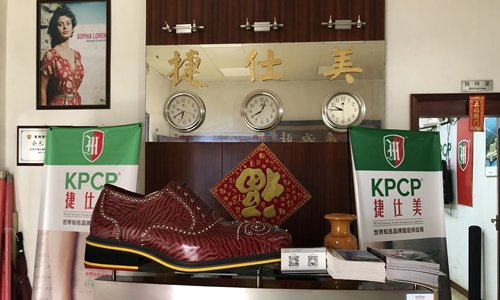HOME >> BUSINESS
Shoemakers stride higher on industry chain
By Zhang Hongpei in Dongguan and Li Xuanmin in Beijing Source:Global Times Published: 2019/5/23 22:08:40
Impact of US trade dispute seen as largely controllable

A view of Dongguan Jieshimei Shoes Materials Co's factory in Dongguan, South China's Guangdong Province on Thursday. Photo: Zhang Hongpei/GT
The nation's shoemaking sector has forged distinctive advantages in the global supply chain over decades of ups and downs that will allow it to withstand the impact of the China-US trade war, industry representatives told the Global Times on Thursday.
During the peak of the shoemaking industry in Dongguan around 2013, a manufacturing hub located in South China's Guangdong Province, about 65 percent of the world's premium or branded shoes came from the hub, said He Jiaming, head of the Dongguan Shoe Chamber of Commerce and chairman of Dongguan Jieshimei Shoes Materials Co.
His company provides counter and toe puffs to both domestic shoe companies and international luxury brands like Burberry and Prada. "Customers have talked to us and they want to place orders in our Vietnam factory to avoid the US tariffs," He told the Global Times on Thursday.
"Our business hasn't been hit hard since it's only partially related to the US market, but for our peers that have heavily relied on that market, they are thinking of new ways out," said He.
Dongguan was once the place to go for foreign shoe companies seeking original equipment manufacturers.
More than 170 US shoe companies and retailers, including Nike, Foot Locker and Under Armour, have warned US President Donald Trump in a letter that there would be "catastrophic" consequences if new proposed tariffs on some $300 billion worth of Chinese exports to the US take effect, the CBS reported Tuesday.
The tariff increase to 25 percent on footwear that is not already subject to Trump's existing tariffs could cost US consumers $7 billion more a year, according to the Footwear Distributors of America, said the report.
On May 10, the US raised tariffs on $200 billion worth of Chinese goods and products from 10 percent to 25 percent. In response, China retaliated last week, announcing tariffs ranging between 5 percent and 25 percent on 5,140 US-origin products worth $60 billion.
It is undeniable that most shoemakers in Dongguan have moved their production and processing lines to Southeast Asian countries like Vietnam due to rising labor and land costs in recent years, but their supply chains still lag behind, according to He.
"You can never find such a complete, mature footwear industrial chain as in China. Vietnam is actually developing very fast, but it won't be the next China, which has forged its own manufacturing advantage since the beginning of reform and opening-up," said He.
For Dongguan, which is aiming at high-end and intelligent manufacturing, the transfer of low-end and labor-intensive industries would also benefit the city's long-term development and make it stronger on its own, said He.
"We're definitely not afraid of the China-US trade war because we have the competence and confidence to survive," he said.
Shoe manufacturers in Quanzhou, East China's Fujian Province, remain calm and they are not frightened by the US tariff hikes, Pan Hongyuan, the secretary general of the Fujian Shoemaking Industry Association, told the Global Times on Thursday. Quanzhou is known as "China's footwear capital" and is home to a complete industry chain.
"After the year-long trade war, Quanzhou suppliers are prepared physically and mentally," Pan noted.
He said that there have been certain short-term impacts on the industry as export prices rise, but the situation is controllable overall as most shoe producers in the city either focus on or have been shifting to the domestic market. "We have built certain well-known brands, such as Anta and 361°, which have digested most local capacity."
Pan said that US consumers could be hit the hardest as they are the ones who eventually pay for the extra tariffs.
In addition to diversifying export destinations to counter the impact of the trade dispute, the domestic shoe market - which is far from saturated - is worth taking a look at, Gao Xianyou, secretary general of the Dongguan Shoe Chamber of Commerce, told the Global Times on Thursday.
"You can find that emerging shoemaking clusters have been expanding the hinterland in recent years such as East China's Jiangsu Province and Northwest China's Xinjiang Uyghur Autonomous Region. The trend proves that the domestic consumption market still has huge scope for growth, especially in the third- and fourth-tier cities and rural towns," said Gao.
Posted in: INDUSTRIES